What this Jewish, gay, 81-year-old Democratic delegate thinks of Biden’s decision
Lew Goldstein taught me civics in fourth grade. He’s “optimistic” about a Harris-led ticket
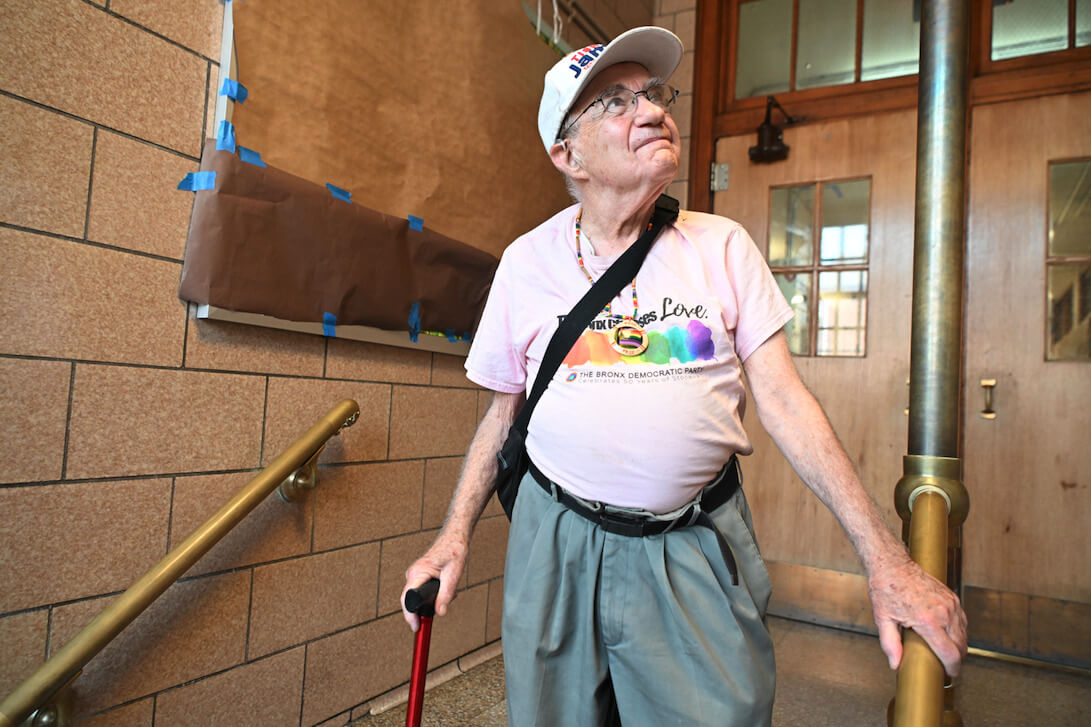
Lew Goldstein in the entryway of P.S. 108, a public school in the Bronx where he was a teacher in the 1970s and 1980s. Photo by Brittainy Newman
As pressure mounted for President Joe Biden to step aside these past few weeks, the only Democrat I knew who thought he should stay in the race was my fourth-grade teacher, Lew Chaim Goldstein. He was also the only person I knew who had a direct role in the debate: Goldstein is a delegate to this year’s Democratic National Convention in Chicago, as he was in 1968.
But even Goldstein said Sunday afternoon that he was “relieved” by Biden’s decision not to seek reelection — if only to end the weeks of Democratic Party infighting over it — and especially glad the president had endorsed Vice President Kamala Harris.
“It’s good for the country,” Goldstein told me. “I’m very happy our president has done the democratic thing, the patriotic thing.”
I had reached out to Lew — he made me stop calling him Mr. Goldstein after I had kids — in the wake of Biden’s disastrous debate performance. He is 81, the same age as Biden, so I thought he might have some insight into the president’s stumbles. Also, back at P.S. 108 in the Bronx, he’d delivered extraordinary and optimistic civics lessons, and I needed a dose of optimism given the endlessly grim news cycle.
Lew and I text and email often. Last year, I copyedited his (so far unpublished) memoir, Lewis Goldstein: A Progressive Democrat Forever. But I had not seen him in person since 2013, at a brunch his political action committee hosted to honor Deepak Bhargava, my best friend in fourth grade and a leading advocate for immigration reform. Mario Cilento, who I had a crush on in second grade and who is now the president of the New York State AFL-CIO, gave the keynote.
Lew has always been a good source for me as a journalist because he’s so politically connected. Senate Majority Leader Chuck Schumer wrote the foreword to his book.
Lew has also always believed that the kids he taught — many of them poor — could lead meaningful, dignified lives in this country. He roots that faith in democracy. And with so many saying their vote means nothing this year, or they’re moving to Canada if their candidate loses, I wanted to see if Lew had retained the hope so many around me seemed to have lost.
We met earlier this month at P.S. 108, where Lew taught before he took a job overseeing special education curriculum for the borough — and where I attended kindergarten through fifth grade, graduating in 1979.
The school’s footprint has doubled since either of us last saw it. But the main building, three stories of yellow brick with some art deco flourishes, looks much the same. The dimly lit staircases still have metal grates, so kids don’t fall over the rails. Lew noticed that there are no blackboards anymore. He wondered if they still teach cursive.
Lew, who is an active member of the largest gay synagogue in the nation, Manhattan’s Congregation Beit Simchat Torah, was sporting a snazzy red cane. He wore a pink Bronx Democrats Pride shirt; a baseball cap promoting New York Attorney General Letitia James — one of the countless politicians on whose campaigns he has volunteered — and pins: a Democratic donkey and two that cross the Pride flag with Israel’s.
“I’m wearing what represents my life,” he said.
Fish tanks and field trips
We settled as best we could into the child-sized chairs in my kindergarten class and put off talking about Biden to reminisce about our class trip to Albany, when Mr. Goldstein taught us how to lobby the legislature. And the time he had us write to Mayor Ed Koch to complain about the budget cuts that squeezed 40 kids into my class.
And the day that Eliot Engel — then a member of the New York state assembly, eventually a chair of the U.S. House Foreign Affairs Committee — came to our class to talk about bills he was working on.
Heady stuff for fourth graders.
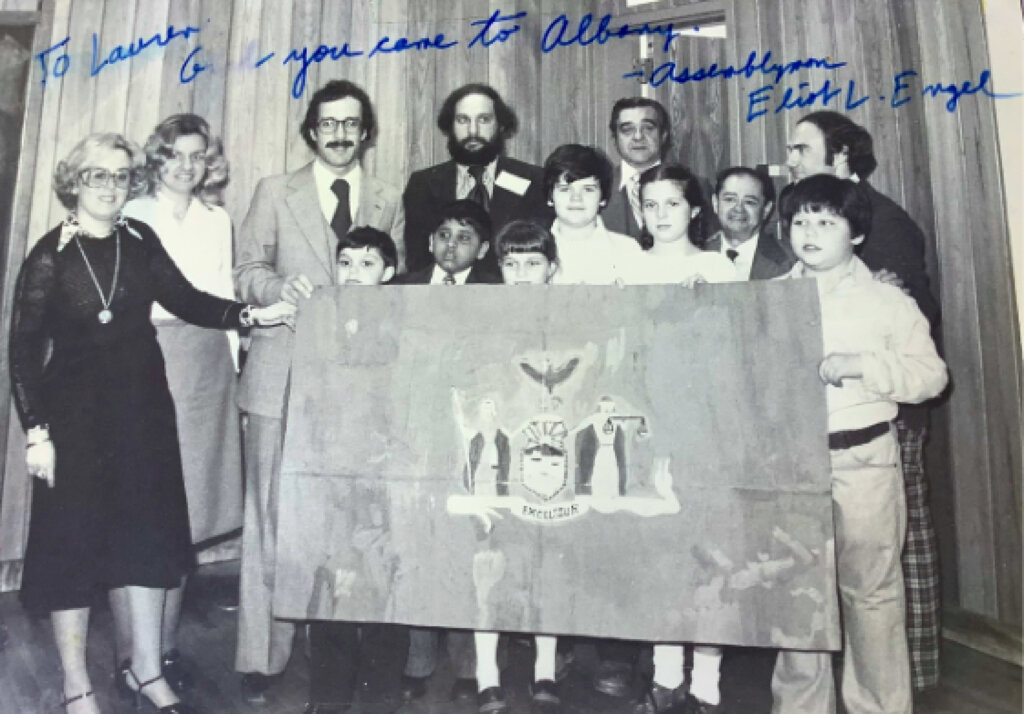
Then Lew asked: “Do you remember the animals?”
Mr. Goldstein, who has lived his entire 81 years in the Bronx, taught us city kids what was then called ecology, and crammed our already crowded classroom with tanks and cages of snakes, fish and a rabbit that surprised us with babies one Monday morning.
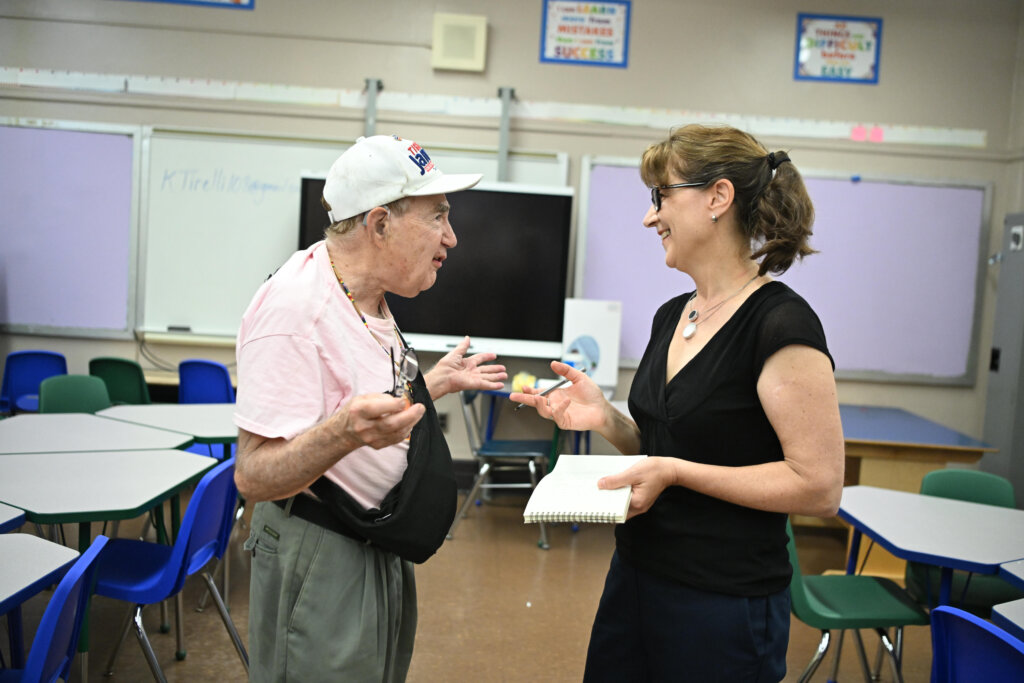
Suddenly I worried that the restaurant I’d picked for lunch might have been a mistake. Enzo’s was a mercifully short half-block walk from P.S. 108 in the summer heat. But the restaurant, a vestige of the neighborhood’s Italian past, has a menu heavy on meat in red sauce, and Lew has been a vegan for more than a decade.
He ordered rigatoni, hold the cheese, and asked for plant-based milk in his coffee, then drank it black because our waiter had no idea what he was talking about. I got my usual when I’m in my old neighborhood, eggplant parmesan.
“I’m a 90% vegetarian now,” I told Lew, half proud, half apologizing for the parmesan.
“Make it a hundred,” he said.
I rolled my eyes and told Lew I was going to the bathroom.
“Where’s your hall pass?” he asked.
The 1968 Chicago DNC
This summer’s Democratic convention will be Lew’s fourth: He was also a delegate in 2012, when President Barack Obama was renominated and went on to triumphant victory, and in 2000, the year of Al Gore, who did not. At his first rodeo, the wild ride of 1968, Lew was 25 years old.
That fateful year, Lew started out supporting Robert F. Kennedy for president. After Kennedy was assassinated, he backed Eugene McCarthy, who opposed the Vietnam War. Two other candidates vied for the nomination — George McGovern and Hubert Humphrey, who won at the convention, and went on to lose to Richard Nixon. Had the Democrats been more united, Lew reasons, they could have beat him.
That’s why he was originally so frustrated by the chorus of critics calling for Biden to step aside. And why he is so glad Biden — and a flurry of prominent Democrats — clearly endorsed Harris Sunday afternoon.
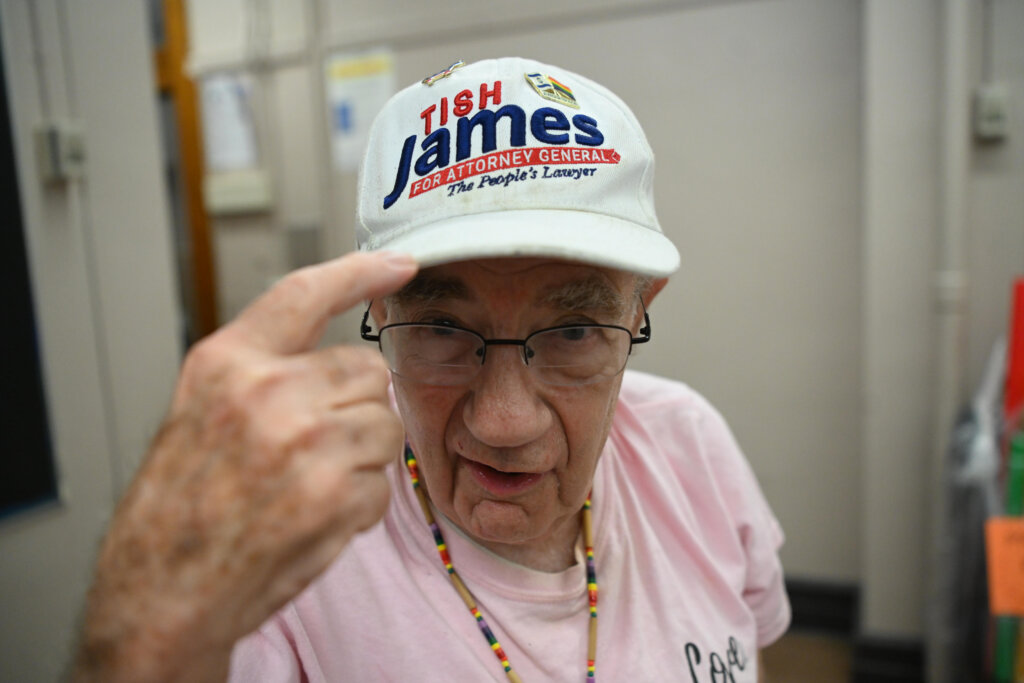
“I look forward to supporting her in Chicago,” he told me over the phone. “We’ll see if anyone opposes Kamala Harris, I hope not.”
Lew, who wears cochlear implants, found a companion, a gay political activist from upstate, to assist him at the convention next month — someone who could tell him what people are saying when the noise makes it hard to hear and, given the cane, help him get around.
One thing he is not worried about is pro-Palestinian protesters disrupting the proceedings. “I have nothing against protesters,” he said. “I’ve been a protester for many, many years — a militant one at times.”
He was arrested once, for demonstrating against the police killing of an unarmed student, Amadou Diallo, in the Bronx in in 1999.
What Lew is worried about most is former President Donald Trump returning to the White House. He told me that might make him leave the country.
“Where would you go?” I asked.
“Costa Rica.”
This is not what I came back to the Bronx to hear. Is Lew saying the great experiment in democracy he taught me about has failed?
‘I’m more gay than I am Jewish’
Lew spent years in denial — and in fear of AIDS — before he came out at 51, but made up for those decades in the closet by throwing himself into queer advocacy.
“I was born Jewish, gay and progressive,” he writes in the first paragraph of the book I helped edit. Its focus is Bronx politics from the 1960s onward, with a particular emphasis on the contest between reform-minded Democrats like Lew and more traditional party stalwarts.
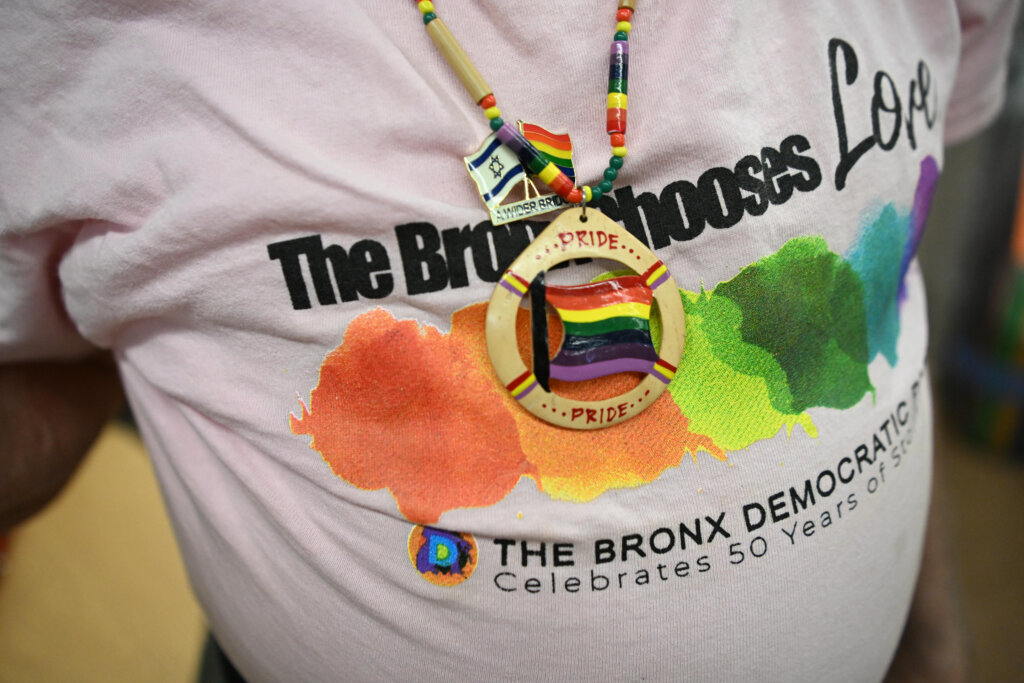
In an early chapter, he writes about a high school friendship with a boy from a Republican family that “survived many heated debates.” For most of his life, Lew writes, he could work with Republicans — like Assemblyman Guy Velella, who lived on the block next to mine.
No one in my family ever voted for him. But we would wave to Velella if we saw him in his driveway, and he would wave back.
Today feels different, Lew said, noting the rise of the Christian right that has pushed to ban abortions and ban books like The Diary of Anne Frank from public schools and libraries. “If there was a banned books list in 1978 when I was your teacher,” he said, “I would have made you read every one of them.”
Lew said he has never been a victim of homophobia — or antisemitism.
“I take the subway back from CBST at night, wearing a kippah,” he said, referring to the legendary gay shul in midtown Manhattan. “Never had a problem.”
It was CBST — proudly gay and deeply engaged in social activism — that drew Lew into Judaism.
“I’m more gay than I am Jewish,” he told me.
He worries that a second Trump term could spell the end of same-sex marriage and other hard-won rights for queer people.
An uncertain future
After lunch, Lew had a CT scan, so when we parted he was nervous about what the doctors might find. I was relieved to get a text as I headed back home to Washington, D.C.: Everything checked out fine.
A few days later, another text from Lew. He had a suggestion for a new ticket: Harris at the top and Michigan Gov. Gretchen Whitmer as her running mate.
It reminded me of fourth grade, when the principal sent an emissary to our class asking for “a strong boy” to carry some boxes, and Mr. Goldstein responded: “I’ll give him a strong girl.”
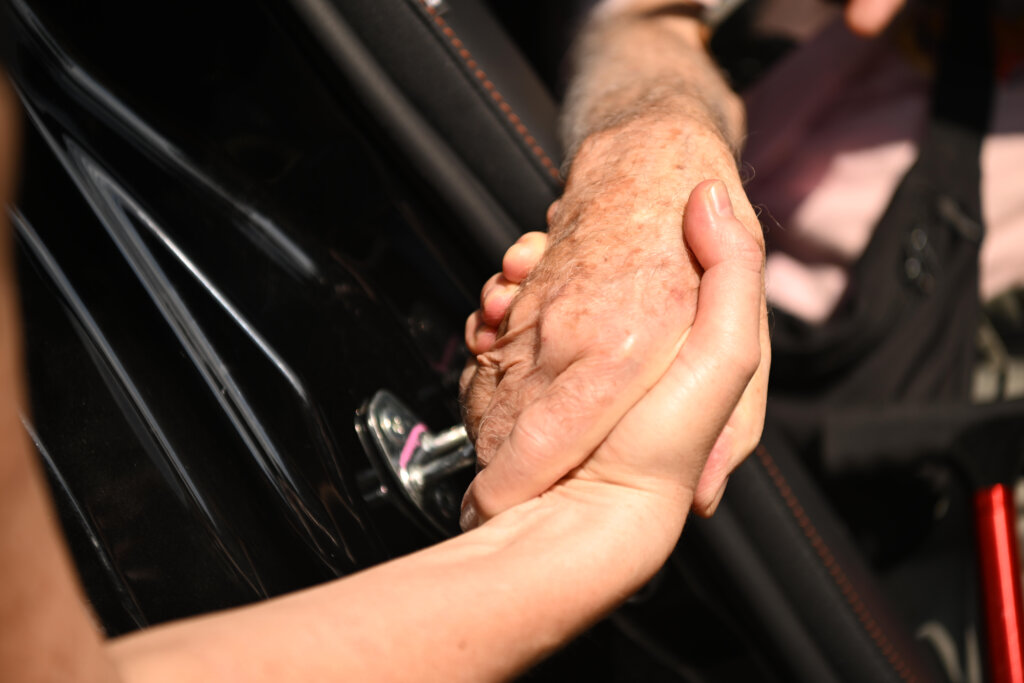
When we spoke on Sunday after Biden endorsed Harris, Lew again suggested Whitmer for the second slot. “I would love to see it but it’s not going to happen — two females or two Black people, or a Latino on the ticket,” he told me. “We’re not there yet.”
My nature-loving teacher spent Sunday morning walking with friends from his synagogue — and his cane — in the Hudson River Valley, and texting me photos of plants. He saw the news about Biden on his phone.
“It was a good day,” he said a couple hours later. “I’m looking forward to less tension in selecting our presidential candidate. I’m feeling optimistic.”

















